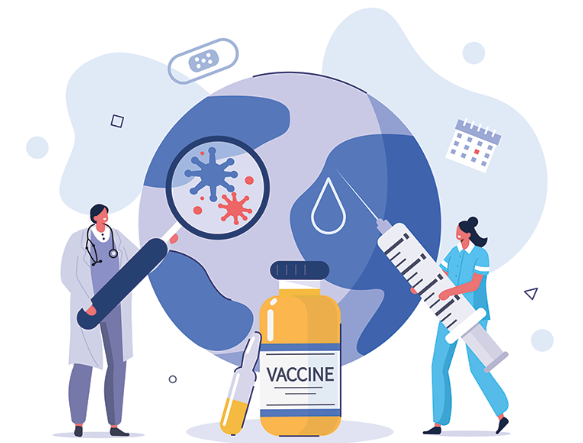World Immunization week is a time to celebrate one of the most significant achievements in modern medicine: vaccines. Vaccination has changed the face of public health, saving countless lives and reducing the spread of deadly infectious illnesses. On this occasion, let us explore the significance of immunization as a major strategy in antimicrobial stewardship, including an understanding of how vaccines operate and why they are critical in protecting individuals as well as communities globally.
Immunization is the process that provides a person immunity or resistance to a certain infectious illness by administering a vaccine. Vaccines include weakened or annihilated microorganisms, or fragments of pathogens, that stimulate the immune system without producing illness.
Following vaccination, an individual’s immune system mounts a response by creating antibodies to fend against the disease, perceiving these benign ingredients as alien invaders. This prepares the immune system to react quickly and efficiently in the event that the individual is thereafter exposed to the actual infection.
Global public health is seriously threatened by antimicrobial resistance (AMR), which raises morbidity, death, and healthcare expenses. Vaccination plays a critical role in combating AMR by preventing infections in the first place, thereby reducing the need for antimicrobial treatment and slowing the emergence of resistant pathogens.
The responsible use of antibiotics to maintain their efficacy is one of the main tenets of antimicrobial stewardship. Vaccines are a great fit for this idea since they provide a proactive approach to disease prevention. We can drastically lower the prevalence of infectious diseases and the demand for antimicrobial medications by immunizing people against common infectious agents including bacteria, viruses, and fungus. Furthermore, by lowering the frequency of secondary illnesses, vaccinations can support antimicrobial stewardship in an indirect way. For example, immunization against influenza can reduce the need for antibiotics in people with the illness by preventing complications such bacterial pneumonia.
One of the most important advantages of vaccination is the concept of herd immunity, often known as community immunity. When a large proportion of the community is vaccinated against a specific disease, a collective shield is formed, preventing the pathogen from spreading. This indirect protection aids people who are unable to get vaccinated for medical reasons or do not have a robust immune response to vaccines. Herd immunity is critical for preventing outbreaks and protecting society’s most vulnerable individuals.
However, maximizing the promise of vaccinations in antimicrobial stewardship necessitates collaborative action. It begins with promoting awareness about the benefits of vaccination and addressing any misunderstandings or concerns that may prevent vaccine uptake. Education is vital in empowering individuals to make informed decisions about their health and the health of their communities.
Healthcare workers have an important role in promoting immunization as a fundamental strategy for antimicrobial stewardship. By introducing vaccination into routine clinical practice, healthcare providers can help ensure that patients receive immunizations appropriate for their age, health status, and risk factors.
Furthermore, policymakers and stakeholders must prioritize funding for vaccination research, development, and delivery systems. This involves funding projects to develop novel vaccines against emerging infectious threats and increasing access to existing vaccinations, particularly in low- and middle-income countries where infectious disease burdens are often highest.
As we mark World Immunization week, let us renew our commitment to defending world health through immunization. By utilizing the power of vaccines as a cornerstone of antimicrobial stewardship, we can ensure the effectiveness of antimicrobial drugs for future generations and build a healthier, more resilient world for all.
READ FURTHER :
The Role of Adult Vaccines as Part of Antimicrobial Stewardship: A Scoping Review : https://tinyurl.com/3k2hkwpu
Vaccination is an integral strategy to combat antimicrobial resistance : https://tinyurl.com/4445vbbb
The role of vaccines in combatting antimicrobial resistance : https://tinyurl.com/yck8vda6
Vaccination is an integral strategy to combat antimicrobial resistance : https://tinyurl.com/3b88wzp5
